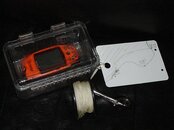fabasard
Contributor
jonnythan:To be a bit pedantic, it's worth noting that geosynchronous orbit does not necessarily place a satellite at a "fixed" position above the earth's surface. Such an orbit is a special case of a geosynchronous orbit and is called geostationary. XM has two geostationary satellites.
Geosynchronous only means that the orbital period of the satellite is the same as the earth. The Sirius satellites don't orbit on the same orbital plane as the earth and so they move in a big figure 8 relative to the earth's surface.
Check out this page to see the orbits of Sirius and XM satellites.
Details, details. YOU KNOW WHAT I MEAN!!! :mooner:




